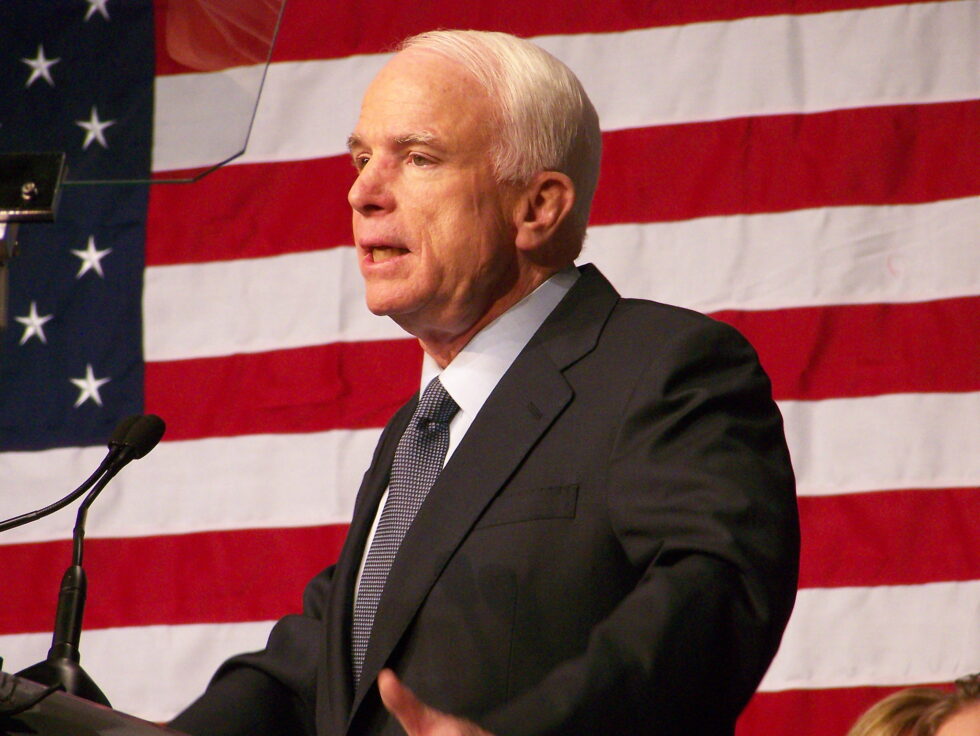This was originally posted on Facebook on February 12, 2008.
I just read John McCain’s victory speech after today’s Republican primaries. This passage caught my eye:
It’s interesting to read this passage in light of Confessions of an Econonomic Hit Man by John Perkins which I’m just finishing. The book is a highly readable exposé of Perkin’s own role in America’s “mistakes” – actually America’s tremendous success in building a global corporatocracy. It’s this corporatocracy that has directly (see Mujahideen) and indirectly nurtured corrosive grievance into extremism.
In McCain’s paradigm any discussion of this reality is weakness. Instead he points to the America’s increasingly thread-bare ideals. What are they, anyway?
The last, best hope of earth
McCain’s use of the phrase “the last, best hope of earth” is a reference to this passage from Abraham Lincoln’s December 1, 1862 annual address to congress in the midst of the Civil War:
Fellow-citizens, we cannot escape history. We of this Congress and this administration, will be remembered in spite of ourselves. No personal significance, or insignificance, can spare one or another of us. The fiery trial through which we pass, will light us down, in honor or dishonor, to the latest generation.
We say we are for the Union. The world will not forget that we say this. We know how to save the Union. The world knows we do know how to save it. We — even we here — hold the power, and bear the responsibility. In giving freedom to the slave, we assure freedom to the free — honorable alike in what we give, and what we preserve. We shall nobly save, or meanly lose, the last best hope of earth. Other means may succeed; this could not fail. The way is plain, peaceful, generous, just — a way which, if followed, the world will forever applaud, and God must forever bless.
In a nutshell Lincoln summed up the American brand in this way: Plain, peaceful, generous, just and absolutely convinced of our manifest destiny in history to subdue our enemies.
Plain, peaceful, generous and convinced of our manifest destiny
Perhaps these values sounded more convincing coming from Lincoln one month before he signed the emancipation proclamation. But today it rings false. As Perkins says:
Today, we still have slave traders. They no longer find it necessary to march in the forests of Africa looking for prime specimens who will bring top dollar on the auction blocks in Charleston, Cartagena, and Havana. They simply recruit desperate people and build a factory to produce the jackets, blue jeans, tennis shoes, automobile parts, computer components, and thousands of other items they can sell in the markets of their choosing…
The old-fashioned slave trader told himself that he was dealing with a species that was not entirely human and that he was offering them the opportunity to become Christianized. He also understood the slaves were fundamental to the survival of his economy. The modern slave trader assures herself (or himself) that the desperate people are better off earning one dollar a day than no dollars at all, and that they are receiving the opportunity to become integrated into the larger world community. She also understands that these desperate people are fundamental to the survival of her company, that they are foundational for her own lifestyle.
How much longer will McCain’s hallucinogenic brew of imperial hubris and thread-bare idealism hold sway? How long will we continue to believe that they hate us because we’re so good?
In the end, this speech does give me hope. The fact that McCain mentioned America’s “mistakes” at all in his speech tonight suggests that somewhere, somehow the corporatocracy is beginning to feel threatened by the light shining through its tattered veil of patriotic idealism.
The featured image for this post of John McCain is “John McCain Town Hall Meeting in Fresno” by 1Flatworld. It is licensed under Attribution-NonCommercial-NoDerivs 2.0 Generic (CC BY-NC-ND 2.0).
